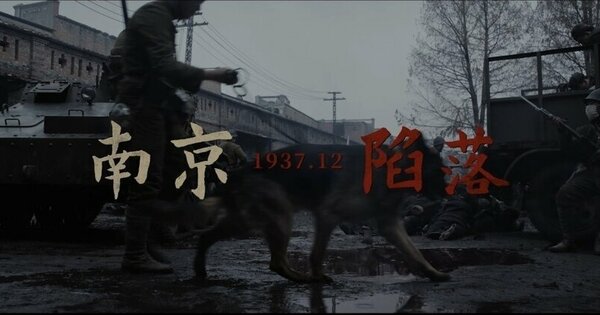By Daichi Harashima
Copyright thejapannews

A screenshot from “Dead to Rights” shows a dog on a street during the Nanjing Massacre. /Provided to CGTN
He reaches into his pocket and unwraps some food. There’s a pining dog in front of him, lying near a limp body. Without concern for the human, Lieutenant Hideo Ito feeds and pets the dog before moving on.
Ito, played by Daichi Harashima, is a central character in “Dead to Rights,” a movie set during the historical tragedy that was the Nanjing Massacre during World War II.
“Dead to Rights” shows audiences the brutality of the Japanese troops during World War II through an authentic depiction of human relationships, humanity and its limitations.
A poster for “Dead to Rights.” /Provided to CGTN
Ito’s lack of humanity in this scene sets the mood of the entire movie. It exemplifies how a supremacist group can truly believe that the group they are oppressing are less human than them. Throughout the movie, the Japanese liken the Nanjing residents to “Chinese dogs” as a way to justify their cruel acts.
“Dead to Rights” is mostly set in a 1930s photo studio, one in which many lies and secrets flow through, as people fight to survive during the occupation. The action plays out on two floors. In the basement, the studio’s owner Lao Jin (Wang Xiao) and family hide. On first floor, A-chang (Liu Haoran) pretends to be a photo developer. He is commandeered by Ito to develop photos Ito has been taking of the Japanese troops to send to their superiors. A-chang is paired with Lin Yuxiu (Gao Ye), who pretends to be his wife, and the two hold up the pretense in the hope of receiving passes from the Japanese to leave the city. This arrangement is negotiated with the Japanese by Yuxiu’s married lover Wang Guanghai (Wang Chuanjun), a translator who comes in and out of the shop every day with Ito.
Yuxiu has also snuck a Chinese soldier, Sergeant Song (Zhou You), into the house. Each character in the building shares just enough of their backstory to stay alive – never enough to create a full picture. But as viewers with the full picture of who is hiding what, we see humanity in the characters, and all the limitations that come with it.
Gao Ye plays Lin Yuxiu in “Dead to Rights.” /Provided to CGTN
In contrast to the general gloom of the events, Yuxia is a beacon of light. She is a layered, complex character – having an affair with a man of questionable ethics, hiding an escapee, smiling and pretending just enough to help her escape her prison. In spite of this, her witty humor persists, especially in exchanges with her pretend husband A-chang. This steal-the-show character also displays immense bravery and sacrifice – highlighting how even in the darkest of times, we can still find joy and laughter.
“Dead to Rights” is about a chapter in history that I had little to no knowledge of beforehand, and was thus a valuable picturization. I was told by others who had seen it before me to prepare for tears, but these didn’t come during the early scenes of murder and death; they came in sympathy for the unity displayed by the characters who knew that even though pain would inevitably come, they were proud of their Chinese identity and their country.
A promotional poster for “Dead to Rights.” /Provided to CGTN
As a South African, I can only relate to this chapter through the lens of my country’s Apartheid era, during which my family and millions of others lived through decades of oppression as one group ruled and segregated every aspect of life.
Apartheid, and the struggle to end it, cost many lives and tore many families apart; its ramifications are still felt today. The oppressive regime was in place post-World War II, in a world where the UN existed, which today upholds the values of equality.
There is a word from South Africa’s Nguni languages, “ubuntu” meaning “humanity to others,” reminding us that “we are who we are because of each other.” Throughout our world’s struggles, the philosophy of ubuntu should always exist and persist.
“Dead to Rights” is a stark reminder of what can go drastically wrong when ubuntu is no longer present.
Source: CGTN



